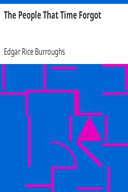Explore
The People That Time Forgot
Edgar Rice Burroughs
1918-2011
2 Ungluers have
Faved this Work
Login to Fave
The members of the tribe showed great interest in me, especially in my clothing, the like of which, of course, they never had seen. They pulled and hauled upon me, and some of them struck me; but for the most part they were not inclined to brutality. It was only the hairier ones, who most closely resembled the Sto-lu, who maltreated me. At last my captors led me into a great cave in the mouth of which a fire was burning. The floor was littered with filth, including the bones of many animals, and the atmosphere reeked with the stench of human bodies and putrefying flesh. Here they fed me, releasing my arms, and I ate of half-cooked aurochs steak and a stew, which may have been made of snakes, for many of the long, round pieces of meat suggested them most nauseatingly. ~~~ Edgar Rice Burroughs created one of the most iconic figures in American pop culture, Tarzan of the Apes, and it is impossible to overstate his influence on entire genres of popular literature in the decades after his enormously winning pulp novels stormed the public's imagination. The People That Time Forgot, first published in book form in 1924 as the sequel to The Land That Time Forgot, is one of Burrough's most thrilling science-fiction adventure stories. Here, modern man Thomas Billings travels to the lost continent of Caspak, near Antarctica, where, in a sheltered tropic jungle, dinosaurs still roam and savage proto-men maintain a strange civilization. Can Billings survive unknown dangers long enough to rescue the missing friend he came in search of? American novelist EDGAR RICE BURROUGHS (1875-1950) wrote dozens of adventure, crime, and science fiction novels that are still beloved today, including Tarzan of the Apes (1912), At the Earth's Core (1914), A Princess of Mars (1917), The Land That Time Forgot (1924), and Pirates of Venus (1934). He is reputed to have been reading a comic book when he died.
This book is included in Project Gutenberg.
Why read this book? Have your say.
You must be logged in to comment.

